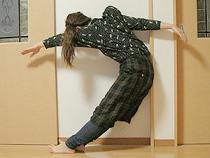

★ 彼女 (かのじょ – kanojo) is Japanese for girlfriend. ★ 幼馴染 (おさななじみ – osananajimi) is Japanese for a childhood friend, or someone you have been friends with since childhood. ★ 親友 (しんゆう – shin’yuu) means best friends or a close friend. ★ 友達 (ともだち – tomodachi) is Japanese for friend or friends. ★ The Japanese word for human relationships is 人間関係 (にんげんかんけい – ningen kankei) ★ Today we will learn some Japanese vocabulary for human relationships!
#HUMAN JAPANESE KATAKANA HOW TO#
Today, we learned how to say some human relationships in Japanese! In these video review notes, we will go over what we learned and we will learn some new words! I certainly want to learn kanji, but with my relatively short time frame, ability to communicate trumps overall knowledge.Īll that said - thanks for your help! I like the recommendation to go with Pimsleur's, so I'll look into that too.Japanese Vocabulary – Human Relationships – Review Notes

Neither of them knew more than a few kanji, but both were able to speak and understand the language and they got along fantastically. I have friends who recently returned from 2 and 5 year stints in Japan. It's a strange priority, but giving the complexity of reading and writing kanji, communication is my immediate goal. User interface is really important for me, so the fact that it's very clean and easy to use is a glowing recommendation for me.Īt the moment, I'm more concerned with being able to speak and listen than read and write. People like you are why I continue to return to reddit and why this community is so successful. I um, got a bit carried away there, but hope that helps!Ībsolutely not! I appreciate the help, seriously. In short, learning radicals is great, but is no replacement for learning kanji learning kanji is great, but is no replacement for learning vocab and learning vocab is great, but is no replacement for understanding sentences, and essentially, the language itself. When it comes to reading comprehension, basically the same philosophy is true, being able to understand what individual sentences mean is key. Concerning listening comprehension, do be a bit careful when learning from things like anime and Edo period dramas though, you don't want to imitate speaking styles exactly, but it's a good idea to understand what they are, what their differences and nuances are, what is appropriate for yourself to speak, and so on and so forth. This means consuming as much media as you can. One piece of advice I wish I was able to give myself when I started this whole thing is that exposure to the language in its natural environment is the most effective way to really learn the language. is a great resource for more advanced grammar lessons, as it's extremely thorough. Ooh, also, I just got acquainted which is very clean and easy to use. I say mess with as many decks as possible and slowly build your understanding of how to use it, it's going to become more useful once you hit intermediate level than it will be right now.

Takes a bit to understand how to configure it exactly to your tastes, but there's a lot of pre-configured decks out there to try. Not to mention good old Anki, which is absolutely great if you want to build your own decks.

#HUMAN JAPANESE KATAKANA FREE#
Memrise has a ton of free vocab courses as well. If you don't mind paying a small monthly fee, Wanikani is a good site for building your kanji/vocab knowledge. Genki does a pretty good job at building a nice core vocabulary in order to get started, but eventually you're going to want to build your vocabulary. Honestly, I'd use as many resources as I can, so feel free to switch between the two and others as often as you like, practice is the only variable here worth noting. I don't have much experience with Human Japanese, but Genki is excellent for learning grammar, and starts slow with the Kanji so it sounds perfect for your level. Sounds like you're gonna need some speaking practice, if you want a good primer, Pimsleur's Speak and Understand Essential Japanese is a good listening resource to help you get acquainted with the spoken language.


 0 kommentar(er)
0 kommentar(er)
